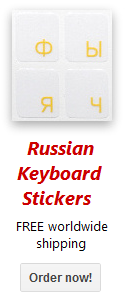 FR FR |
About us | Home | User agreement | Link to us |
The Dative Case
The dative case is an oblique case. It is used in the sentences like "Я даю это... учителю, отцу, матери" (I give this to... a teacher, father, mother). You should easily remember this sentence, because the Russian name of the dative comes from the verb "давать", i.e. "to give". The nouns in the dative answer such questions as Кому? Чему? (To whom? For what?).
| Я даю ручку кому? | Я даю ручку учителю. | - | To whom do I give the pen? | I give the pen to a teacher. |
| Катя радуется чему? | Катя радуется солнцу. | - | What is Katya happy at? | Katya is happy at the sun. |
The dative can be used with prepositions or without them. The typical prepositions for the dative are: к, по, подобно, согласно, благодаря, вопреки. For example:
| к сестре | to a sister | |
| по воде | by water | |
| согласно расписанию | according to time-table | |
| благодаря брату | thanks to a brother |
The principal meaning of the dative is "to" or "for". The dative is used to designate an addressee (recipient). For example: написать письмо другу (to write a letter to a friend), дать совет сыну (to give a piece of advice to a son).
The dative is also used to show an object towards which an action is directed. For instance, верить другу (to trust a friend), помогать сыну (to help to a son).
The dative is formed from the nominative singular nouns with the help of the following endings: -у, -ю, -е, -и (singular); -ам, -ям (plural). In most cases, you should remove the last letter from the nominative of the noun and add one of the mentioned endings (сестра less -а plus -е = сестре). In some cases, the endings are to be added to the nominative singular noun without taking the last letter off (брат plus -у = брату).
The tables below sum up how the dative of nouns is formed.
The Dative of singular nouns
| Nominative singular | Remove | Add | Dative | |
| masculine |
брат чай папа |
-- й а |
у ю е |
брату чаю папе |
| neuter | окно море |
о е |
у ю |
окну морю |
| feminine | ночь вода |
ь а |
и е |
ночи воде |
Explanation of the table:
Add -у to masculine nouns ending in a hard consonant (брат) and neuter nouns ending in -o (окно).
Add -ю to masculine nouns ending in -й, -ь (чай, учитель) and neuter nouns ending in -е, -ие (море, орудие).
Add -и to feminine nouns ending in -я, -ь except some personal names (печь, армия).
Add -е to feminine and masculine nouns ending in -a (вода, папа).
The Dative of plural nouns
| Nominative singular | Remove | Add | Dative plural | |
| masculine | мост брат край учитель |
-- -- й ь |
ам ьям ям ям |
мостам братьям краям учителям |
| neuter | окно море |
о е |
ам ям |
окнам морям |
| feminine | дочь* коса стая |
ь -- -- |
ям м м |
дочерям косам стаям |
* The noun "дочь" changes its stem.
Explanation of the table:
Add -ам to masculine nouns ending in a consonant, neuter nouns ending in -o and feminine nouns ending in -a.
Add -ям to masculine nouns ending in -й, -ь, -я, neuter nouns ending in -e and feminine nouns ending in -я, -ь.
Got questions?
Ask them in the Russian Questions and Answers — a place for students, teachers and native Russian speakers to discuss Russian grammar, vocabulary, pronunciation, and other aspects of the Russian language.
Copyright 2001-2026 MasterRussian.com | Privacy Policy | Contact Us
 Russian Lessons
Russian Lessons
- Russian alphabet
- Names of letters
- Russian Q&A new
- Pronunciation: Cons.
- Pronunciation: Vowels
- Noun Gender/Number
- Cases of Nouns
- Russian Greetings
- Personal Pronouns
- Learning Russian
- 1000 Common Words
- 500 Russian Verbs
- Top Russian Nouns
- » All lessons
- » Guest lessons
 Browse Topics
Browse Topics
- Start learning Russian
- Forum
- Bookstore
- Dictionaries
- Russian - basic
- Russian - adv
- Pronunciation
- Russian Blog new
- Reading
- Test & quizzes
- Translation
- Verbs
- Verb Conjugations
- Russian numbers
- Russian Tests new
- Vocabulary
- Writing
- Folk music
- Fun stuff
- Leo Tolstoy
- Learner's lore
- Literature
- Personal blogs
- Picture Dictionary new
- Proverbs
- Publications
- Radio & TV
- Russian culture
- Schools in Russia
- Russian Words
- Russian names
- Software
- Russian Words iPhone
Clicks the "Like" button below to get daily updates on Facebook!
Click "Add to circles" to learn Russian on Google+

Search MasterRussian

English » Russian dictionary

WORD OF THE DAY
![]() RSS
|
iGoogle
|
My Yahoo!
RSS
|
iGoogle
|
My Yahoo!
Meaning: night
Pronunciation: [nohch']
Learn Russian words! »
TODAY'S STREET SIGN

Russian: Берегись автомобиля
English: Watch for cars
FOLLOW US ON TWITTER

MasterRussian on Twitter


